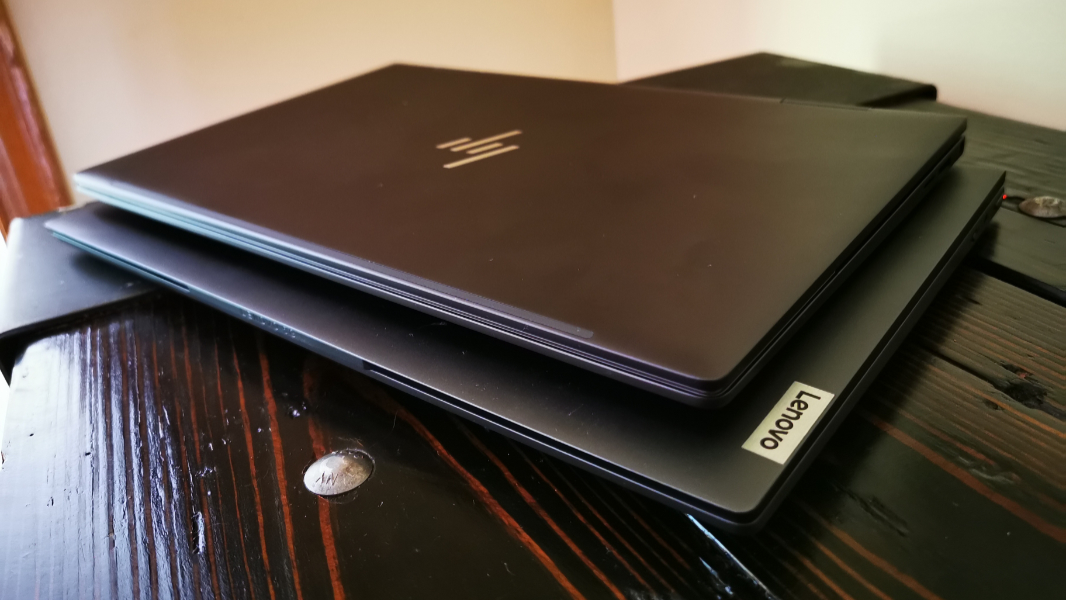A Tale of Two Laptops
- Paul Thurrott
- Jul 09, 2020
-
28

I’m currently reviewing two laptops, the AMD-based HP Envy x360 13 and the Snapdragon-based Lenovo Flex 5G. Despite some obvious physical similarities—both are modern convertible laptops—they could not be more different.
To be clear, this isn’t about HP vs. Lenovo. Both firms offer AMD- and Snapdragon-based hardware in addition to the more standard and widespread Intel fare, and it’s just coincidental that I happen to have each of these PCs in for testing at the moment, and have been using them side-by-side and noting the differences.
Windows Intelligence In Your Inbox
Sign up for our new free newsletter to get three time-saving tips each Friday — and get free copies of Paul Thurrott's Windows 11 and Windows 10 Field Guides (normally $9.99) as a special welcome gift!
"*" indicates required fields
The most interesting part of this discussion, to me, is that both run on hardware platforms seeking to undermine Intel, and that both are doing so using wildly different approaches.
The HP is based on the AMD Ryzen 4000 series processor with Radeon graphics, while the Lenovo runs on the Qualcomm Snapdragon 8cx. That means that the HP runs what I think of as “normal” Windows 10, or what Microsoft now calls Windows 10 desktop, while the Lenovo relies on what we should be calling Windows 10 on Snapdragon but Microsoft calls Windows 10 on ARM (WOA).
Performance is starkly different on the two PCs. The WOA-based Lenovo stutters sometimes when using the shell and with native apps, and I’ve experienced unresponsive app problems far more than is typical. Everything seems to come with a bit of a wait, even when it does work. This is troubling, as I had expected the 8cx to provide a much more seamless day-to-day experience than I’m seeing.
The AMD-based HP, meanwhile, is a performance champ, and I’ve actually noticed that Visual Studio compiles are much faster on this PC than is the case with the Intel-based HP EliteBook x360 14 that I normally use. (I’ve been using the HP to recreate .NETpad in UWP in my UWP Notepad Project (Redux) series, for example.) The performance is excellent.
I wrote about my early compatibility experiences with the WOA-based Flex 5G last week, but I’ve expanded my understanding of its limitations since then and am somewhat overwhelmed by the fact that my early takeaway about WOA still applies two years later: Everyone will have that one app or one driver-set or whatever that they absolutely rely on but WOA can’t run. And in my case, those incompatibilities are adding up. This platform simply isn’t ready for the mainstream, and I shudder to think about the reaction of any normal person who confronts this kind of problem a few weeks or months into ownership. It’s a real gotcha moment.
The AMD-based Envy is, of course, (almost) one hundred percent compatible with all of the software and hardware peripherals one would need. I was curious about things like Hyper-V and Android device virtualization in Android Studio, but they both work fine. The one issue that some may run into, but not the mainstream users I worry about above, is Thunderbolt 3 compatibility: The Envy supports USB-C, but not Thunderbolt 3.
As an Always-Connected PC, the WOA-based Lenovo ships with a SIM card slot and is, in fact, the world’s first 5G-based PC. Lenovo was nice enough to ship the review unit with a Verizon 5G SIM for testing, though I’ll never see 5G speeds here in rural Pennsylvania. Or hell, anywhere in Pennsylvania, since Verizon doesn’t even offer 5G in Philadelphia. But I’ve been testing it, and it seems to work well. HP doesn’t offer a cellular option in the Envy, to my understanding, but such a thing would certainly be possible. (And HP does offer this capability in many of its PCs.)
I know battery life is a key concern for both PCs. And so far, I’ve been impressed with both.
The WOA-based Flex 5G has delivered an average of 14:20 of battery life, almost solely in typical productivity usage since I can’t get Visual Studio to run acceptably well to even bother. The HP, meanwhile, has performed well, too, delivering an average of 7:50 of battery life during mixed usage (typical productivity work sometimes and Visual Studio development in others).
Clearly, this one is no contest. But if given the choice, I’d take the full compatibility and superior performance of the AMD-based HP over the stellar battery life of the WOA-based Lenovo any day. In fact, I find myself making the very choice, despite the Flex 5G’s bigger 14-inch display. The performance issues with the WOA-based Flex add up too.
Look, it’s clear that ARM or something like it is the future of personal computing. But AMD’s approach of meeting and then beating Intel where the market is now seems like the sounder investment at this time. This experience has also driven home the correctness of Apple’s approach with its own ARM-based silicon: Rather than foist what is essentially experimental early hardware on its customers as Qualcomm, Microsoft, and their PC maker partners have done to date, waiting until this platform was ready from performance and compatibility perspectives would have been the better choice.
I’ll keep testing each, of course, and will eventually summarize it all in separate reviews. But from this mid-way standpoint, it’s clear that only one of these PCs—and thus, only one of these underlying platforms—delights me at the moment. And sorry, folks, but it ain’t Windows 10 on ARM.